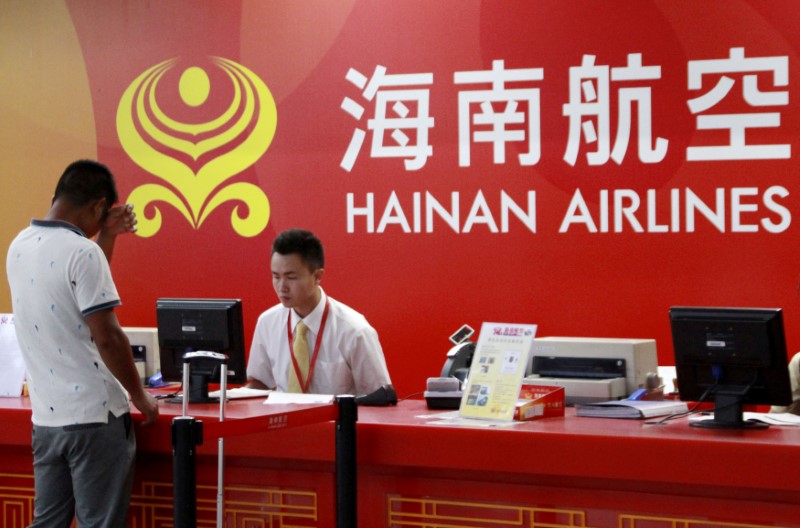By Kane Wu and Sumeet Chatterjee
HONG KONG (Reuters) - China plans to further tighten the screws on overseas acquisitions by Chinese companies and borrowing to fund those transactions, and has started closely scrutinizing the commercial aspects of the deals, three people familiar with the move said.
The National Development and Reform Commission (NDRC), and the Ministry of Commerce (MOFCOM) are now reviewing deal agreements in minute detail, said the people, who work with various regulatory bodies and Chinese companies on their acquisition plans.
The two bodies are asking companies looking to buy assets overseas to justify terms, including target valuations, deal premiums and financing arrangements, they said.
This was particularly the case with companies not seen by the Chinese government as "strategic," they said.
The tightened measures have been issued as informal guidance by Chinese regulators and have not been made official yet, said two of the people.
The tightening of regulatory oversight for outbound purchases comes as Beijing is cracking down on some large domestic conglomerates for their debt-fuelled acquisitions abroad of assets ranging from hotels to movie studios.
The regulatory measures, if in place for an extended period, could deter some companies from making overseas acquisitions, and could also weigh on outbound deal volumes in China.
China's outbound M&A volumes nearly halved in the first six months of this year to $64.2 billion following a crackdown on capital outflows, after Chinese companies spent a record $221 billion on assets overseas in 2016, according to Thomson Reuters data.
On top of tightened scrutiny of deal terms, the country's foreign exchange and banking regulators are also looking to step up their monitoring of loans made by the overseas branches of Chinese banks, two of the people said.
Those two regulators - the State Administration of Foreign Exchange (SAFE) and the China Banking Regulatory Commission (CBRC) - also plan to make it tougher for companies to borrow overseas by pledging some assets in China, the people said.
Borrowing funds from foreign banks and overseas branches of Chinese banks by pledging real estate and other assets in the mainland with local banks has been a common practice for some companies looking to fund foreign acquisitions.
But some industry officials have questioned the quality of those pledged assets, and whether the lenders would be able to raise money against those in case borrowers defaulted on their repayment obligations.
SAFE said in a written reply to questions from Reuters that it would strengthen China's financial market regulations along with other financial supervisory authorities to ward off overseas investment risks while promoting trade and investment.
It said it would guide financial institutions to strengthen their compliance and risk management with regards to foreign loans backed by domestic guarantees. "We will strictly crack down on fake and malicious guarantees, to promote overseas investment in a healthy and orderly way."
The foreign exchange regulator also said it would encourage domestic companies with the capability of investing overseas to pursue "authentic and legitimate foreign deals, and encourage domestic banks to exercise prudence when offering financing services."
The three people familiar with the decision to scrutinize deals more closely declined to be identified as they were not authorized to discuss regulatory matters in public. Officials at the banking regulator, the commerce ministry, and the NDRC did not immediately respond to faxed requests for comment.
IMPORTANT FOCUS
China started tightening capital outflows in the second half of last year. In June this year, the regulators ordered a group of lenders to assess exposure to some of China's more aggressive dealmakers, including HNA, the property-to-film conglomerate Dalian Wanda and Anbang Insurance Group.
Beijing's stepped up deleveraging campaign, as part of efforts to control debt risk to the broader financial system and to maintain economic stability, comes ahead of a key party meeting later this year.
While submitting share purchase agreements for overseas deals with the NDRC is a long established practice for Chinese companies, previously the regulator did not pay close attention to pricing and funding details, two of the people said.
"The level of inquiry has gone a lot deeper than the past - who you are as a buyer and what you are buying are of important focus," one of them said, referring to the NDRC scrutiny of the deal proposals.
Much of these new regulatory measures, however, would not be applicable for overseas acquisitions related to Chinese President Xi Jinping's signature foreign policy, the Belt and Road initiative, the people said.
Last year, China's acquisitions in the Belt and Road regions, which span vast regions from China to Europe and Africa, totaled about $10 billion, according to a research report by Thomson Reuters and Chinese institutions published last month. SAFE also said it would back domestic companies participation in the initiative.
"The regulators want to ensure that capital now would not be that easily available to those deals that are neither strategic for the country nor for the company," said one of the people in Beijing who advises Chinese companies on M&A transactions.

"The are looking to plug the regulatory arbitrage that some companies took advantage of."